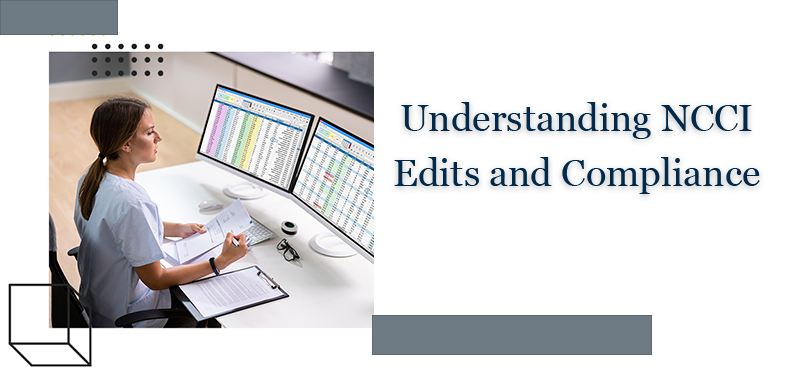
Understanding NCCI Edits and Compliance
CMS created the NCCI program to help ensure that Medicare Part B claims are coded correctly across the country. CMS is in charge of the NCCI program and makes all the decisions about what it includes. To develop its coding policies, CMS looks at the rules laid out in the American Medical Association’s CPT Manual. It also considers national and local policies, guidelines from medical societies, how medical procedures are typically done, and what coding practices are currently being used. However, there are many ways to stay abreast of this, including compliance webinars, news, and this article. Let’s delve into this article to acknowledge the latest NCCI edits.
Understand NCCI Edits
NCCI edits consist of two types: Procedure-to-Procedure (PTP) edits and Medically Unlikely Edits (MUEs). PTP edits identify pairs of Healthcare Common Procedure Coding System (HCPCS) or Current Procedural Terminology (CPT) codes that should not typically be billed together on the same date of service for a single patient. MUEs, on the other hand, establish the maximum units of service that providers can report for specific codes on a single date of service.
The rationale behind NCCI edits is to ensure accurate coding and billing practices, prevent billing errors, affect outpatient hospital services, therapy providers, and certain home health agency claims, and deter fraud and abuse within the healthcare system. Compliance with NCCI edits is mandatory for Medicare claims and is often adopted by other payers as well.
NCCI Edit Changes You Need to be Updated
Staying current with the latest updates in NCCI edits is crucial for compliance. CMS regularly releases updates to NCCI edits, including new code pairings, modifier indicators, and policy changes.
In the latest update from CMS on September 14, 2023, replacement files were issued for NCCI Procedure to Procedure (PTP) edits for the fourth quarter of 2023. Effective July 1, 2023, certain PTP edits involving specific medical tests were implemented but will now be withdrawn retroactively to that date. These edits affected claims with dates of service between July 1, 2023, and October 1, 2023. Medicare Administrative Contractors (MACs) will adjust these claims accordingly to ensure proper payment, either automatically or through the appeals process.
Another change, effective July 1, 2023, involved bypassable NCCI PTP edits related to certain medical procedures. These edits will be deleted from the October 1, 2023 edit files. Claims previously denied due to the lack of a modifier will be reviewed and adjusted by MACs for proper payment. Providers have the option to utilize the MAC appeals process or wait until CMS implements the change before submitting claims.
NCCI updates its Procedure to Procedure (PTP) and Medically Unlikely Edits (MUE) files quarterly. However, there are occasions when changes are necessary outside of these scheduled updates, prompting CMS to issue replacement files. For instance, on December 7, 2022, replacement files were released for the first quarter of 2023, reflecting updates to PTP edits for that period. Keeping abreast of these updates ensures compliance with CMS coding policies and helps healthcare providers navigate billing processes effectively.
Tips for NCCI Compliance
Education and Training: Healthcare providers, coders, and billing professionals should undergo regular training on NCCI edits and updates. Training compliance webinars or programs should cover the fundamentals of NCCI edits, common code pairings, modifier usage, and compliance guidelines.
Utilize NCCI Tools: CMS provides various tools and resources to assist providers in understanding and applying NCCI edits. These include the NCCI Policy Manual, NCCI Quarterly Update files, and the NCCI edit lookup tool. Leveraging these resources can facilitate accurate coding and billing practices.
Audit and Review: Conduct regular internal audits to identify any potential coding errors or compliance issues related to NCCI edits. Address any discrepancies promptly and implement corrective actions to mitigate future risks.
Documentation Integrity: Ensure that medical documentation accurately reflects the services provided and supports the billed codes. Proper documentation is essential for justifying the medical necessity of services and defending against potential audits or reviews.
Collaboration and Communication: Foster collaboration between clinical staff, coding professionals, and billing staff to ensure a comprehensive understanding of NCCI edits and compliance requirements. Clear communication channels facilitate the exchange of information and promote adherence to coding guidelines.
Navigating NCCI edits and ensuring compliance with billing regulations can be challenging, but it is essential for maintaining integrity within the healthcare system. By understanding the fundamentals of NCCI edits, staying updated on the latest developments, and implementing robust compliance measures, healthcare providers can enhance coding accuracy, minimize billing errors, and mitigate compliance risks. Compliance with NCCI edits not only safeguards against potential audits and penalties but also promotes transparency and accountability in healthcare billing practices.




